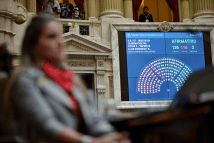In the early hours of this Friday, the law of bases and starting points for the freedom of Argentines (better known as the Bases Law) and the law of palliative and relevant fiscal measures (better known as the fiscal package) finally obtained sanction. These are the first two projects of the Milei government approved by the National Congress..
These are regulations that apply throughout the country. However, the heterogeneity inherent in such a large and diverse country means that the effects differ depending on the region considered. In particular, the relative impact on Patagonia is dual..
The restitution of the income tax (now called personal income tax) was accompanied by the elimination of the additional deduction for unfavorable areas of 22% that workers or retirees in the Patagonian region have.This happened because the chapter on Profits (which did not contain this deletion) was rejected in particular in the Senate since the Chamber of Deputies insisted on the project that had half sanction.
The consequences of this point are direct and indirect for Neuquén and Río Negro. The approval of the Fiscal Package harms Patagonian workers more and creates an unequal tax system. For the same task and under the same collective bargaining agreement, an employee from Patagonia could start paying Profits and one from Buenos Aires, for example, would not.. In other words, the elimination of the deduction for unfavorable areas could cause the salary of a Patagonian worker to exceed the non-taxable minimum.
The approval of the Fiscal Package harms Patagonian workers even more and creates an unequal tax system.
This change in regulations brings about the unification of the tables in Patagonia and the rest of the country, despite the differences in salary levels (and in the cost of living). Thus, Another distortion that is introduced with the restitution of the tax is that, for the same task and the same collective bargaining agreement, a worker from Patagonia could pay a higher rate than one from another region of the country..
These situations imply that the relative deterioration of disposable income in Neuquén and Río Negro will be greater than in the provinces of the center and north of the country.. Therefore, a greater negative impact of the tax in terms of consumption, level of activity and even local revenues is expected for the Patagonian provinces. Due to the co-participation regime, the status of “net contributor” of the province of Neuquén is also consolidated.
In the oil and gas sector, “The number of workers who would benefit from Law 26,176 is limited, which would now include only those who are at the wellhead“, said accountant Gonzalo Gutiérrez, from the Chinni, Seleme, Bugner y Asociados firm. This regulatory change harms Neuquén and Chubut more than any other jurisdiction.
Tourism, energy, oil and gas constitute fundamental sectors for Neuquén and Río Negro, and are all covered in the RIGI.
In the medium term, and if Neuquén and Río Negro adhere to the incentive regime for large investments (RIGI) contained in the approved Ley Bases, a greater flow of investments could more than compensate for the damage caused in the fiscal area. Tourism, energy, oil and gas are key sectors for these provincial economies, and are all covered by the RIGI..
It is worth mentioning that the RIGI also covers infrastructure works. This aspect is relevant considering that Río Negro could be the province where the construction of a liquefied natural gas plant is carried out. The project was announced as the largest infrastructure investment in the history of our country, and could change the productive matrix of the northern Patagonian province..





